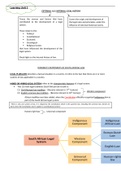Summary
Summary EXTERNAL AND INTERNAL LEGAL HISTORY DIFFERENT COMPONENTS OF SOUTH AFRICAN LAW THE SOURCES OF LAW: THE RELATIONSHIP BETWEEN THE DIFFERENT COMPONENTS THE RECEPTION PHENOMENON
- Institution
- University Of South Africa (Unisa)
EXTERNAL AND INTERNAL LEGAL HISTORY DIFFERENT COMPONENTS OF SOUTH AFRICAN LAW THE SOURCES OF LAW: THE RELATIONSHIP BETWEEN THE DIFFERENT COMPONENTS THE RECEPTION PHENOMENON
[Show more]



